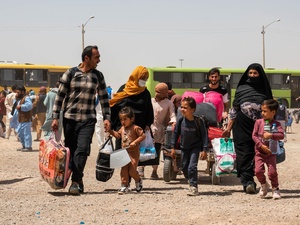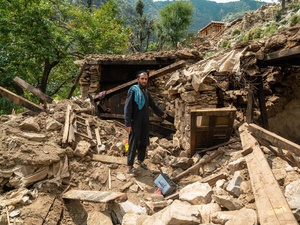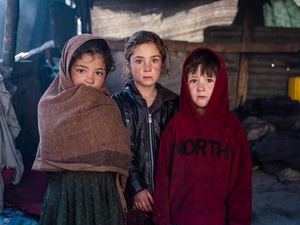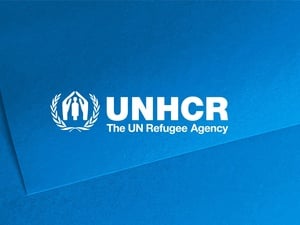UNHCR begins assessing needs of thousands of internally displaced persons around Kabul
UNHCR begins assessing needs of thousands of internally displaced persons around Kabul
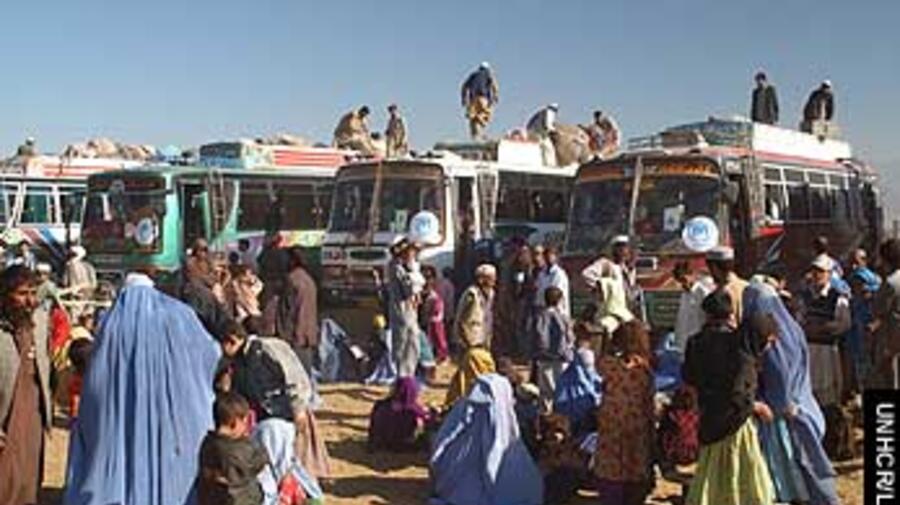
Refugees being relocated from the Jalozai site near Peshawar to Kotkai further inland from the Afghan border.
KABUL, Dec. 4 (UNHCR) - The United Nations High Commissioner for Refugees Tuesday began assessing the needs of tens of thousands of internally displaced persons around the capital of Kabul in an effort to better target its aid programmes in the coming weeks.
The agency, which hopes to help up to 50,000 people in the region, also said that it had distributed winter emergency kits over the weekend to 10,500 persons in the Kabul area, many of whom had their homes destroyed during the recent US-led bombing campaign.
The refugee agency said it was preparing to help more than 30,000 Afghans back to their homes in the Shomali Plains north of Kabul as soon as de-mining operations make it safe for them to return.
Meanwhile, UNHCR is continuing to monitor population movements in and out of Kabul, with more than 7,000 people returning to the capital last week. The refugee agency estimated that 5,000 of those who returned were internally displaced persons who fled the city to escape the bombing, while the others were refugees returning from Pakistan.
In a late-breaking development Tuesday, reports from Peshawar said three unidentified gunmen fired at a UNHCR vehicle in a remote region of north-west Pakistan, but there were no injuries. Police said the incident took place as Isabelle Fartash, a UNHCR official, was returning from a visit to an Afghan refugee camp.
The refugee agency said it would suspend relocation operations Wednesday while the incident is being investigated.
UNHCR had begun relocating ethnic minorities Tuesday from the Jalozai camp near Peshawar in North-West Frontier Province, with the first convoy of eight buses carrying 400 refugees making the 230-kilometre trip from Peshawar in northern Pakistan to the Old Bagzai camp in Kurram Agency. Although Old Bagzai is in a tribal area dominated by Pashtuns, non-Pashtun Sunni Muslims such as the Tajiks and Uzbeks transported Tuesday are accepted by the local population.
A second convoy carrying 129 so-called "invisible refugees" were relocated from Peshawar to Kotkai. Invisible refugees are defined as those who entered Pakistan through backroads and mountain passes following the September 11 attacks, but who melted into the local population or stayed with refugees in an effort to avoid deportation by the Pakistani authorities.
All the refugees received warm meals and blankets, as well as household items, upon arrival at the Old Bagzai and Kotkai camps.
Asked at a news briefing in Geneva about the thousands of people fleeing the fighting in the southern Afghan city of Kandahar, UNHCR spokesman Ron Redmond said reports indicated there were up to 60,000 internally displaced persons in the border town of Spin Boldak.
He said that while security conditions did not allow UNHCR international staff to work in the city, local non-governmental organisations had delivered UNHCR tents and other material to the area.
"We would prefer as a refugee agency to see these people cross the border into Pakistan where we could take care of them," Redmond said.


